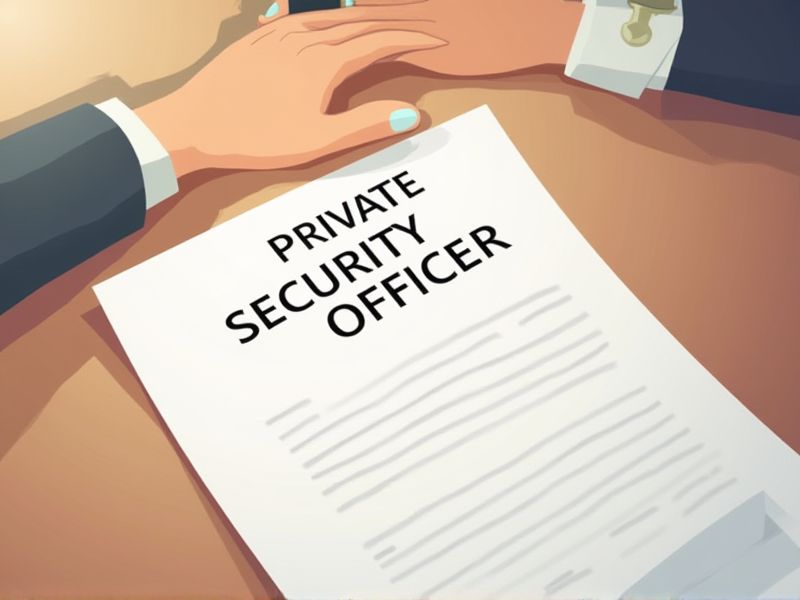
Private security officers require certain certifications to ensure they possess the skills needed to handle diverse security challenges. Certifications validate an officer's expertise in risk assessment, emergency response, and effective communication techniques. Employers and clients seek assurance that their security personnel meet industry standards and legal requirements. Here are some essential certifications you might need as a private security officer.
State-Issued Private Security License
A state-issued private security license ensures that private security officers meet standardized training and competency requirements, aligning with local and national regulations. It provides legal recognition, allowing officers to carry out their duties lawfully and with authority. Licensing enhances public trust by verifying that security personnel adhere to ethical and professional standards. It acts as a barrier to entry, preventing unqualified individuals from operating within the industry and potentially compromising safety.
Basic Security Guard Training Certification
Basic Security Guard Training Certification enhances the skill set of a private security officer by providing foundational knowledge in surveillance techniques and emergency response strategies. Training ensures officers understand regulatory requirements, reducing the risk of legal non-compliance in their operations. Certified training improves an officer's ability to effectively manage stressful situations, thereby increasing safety for clients and the public. Obtaining certification signals professionalism and competence, making officers more attractive to potential employers seeking reliable security personnel.
CPR and First Aid Certification
Private security officers often encounter situations where prompt medical intervention can save lives, necessitating CPR and First Aid certification. This training equips them with the skills to stabilize victims until professional medical help arrives. Certified officers can handle medical emergencies, which enhances the security service's overall reliability and reputation. In high-risk areas, this capability can also act as a deterrent, providing peace of mind to clients and employers.
Firearms Qualification Certification
Firearms Qualification Certification is essential for private security officers because it ensures they possess the necessary skills to handle weapons safely, reducing the risk of accidents. Enhanced firearm proficiency leads to improved security outcomes, as officers are better prepared to respond to threats. Certification reinforces accountability, requiring officers to adhere to regulations and standards that protect public and private interests. Demonstrating competency through certification builds trust with clients and the community, fostering a safer environment.
Use of Force Certification
Use of Force Certification equips private security officers with the necessary skills and knowledge to handle potentially dangerous situations responsibly. Proper certification reduces liability risks for security companies and their clients, ensuring that officers adhere to legal and ethical standards. This certification enhances the credibility and trustworthiness of private security personnel in the eyes of the public and law enforcement agencies. Well-trained officers with force certification are more likely to de-escalate conflicts successfully, resulting in safer environments for everyone involved.
Defensive Tactics Certification
Holding a Defensive Tactics Certification equips private security officers with the skills required to handle confrontational situations effectively. Training ensures they can protect themselves and others without resorting to excessive force. Certification also builds trust with clients who rely on professional protection. In many regions, possessing such a certification is mandatory to comply with regulatory standards.
Crisis Intervention Training Certification
Crisis Intervention Training Certification equips private security officers with essential skills to manage and de-escalate potentially volatile situations. With such certification, security personnel can identify and address mental health issues, reducing the likelihood of physical confrontations. This training enhances their ability to communicate effectively and handle stress, promoting safer environments. Security officers thus improve their response time and actions during critical incidents, which is vital for maintaining public trust and safety.
Emergency Preparedness Certification
Emergency preparedness certification enhances a private security officer's ability to effectively respond to unforeseen crises, thereby increasing overall safety. Certification ensures that officers are equipped with the necessary skills and knowledge to handle emergencies, such as natural disasters or security threats, which reduces risk and potential liabilities. By being formally educated in emergency protocols, officers can coordinate better with emergency services, streamlining response efforts. For private security companies, having certified officers improves their reliability and perceived professionalism, granting them a competitive edge.
Crowd Management Certification
Crowd management certification equips private security officers with essential skills to effectively handle large gatherings, reducing the risk of panic or chaos. Proper certification ensures officers are familiar with legal guidelines and best practices, minimizing potential liabilities for security firms or event organizers. Certified officers are more adept at identifying potential threats or bottlenecks within crowds, enhancing overall event safety. Training in crowd management boosts an officer's decision-making abilities during high-pressure situations, leading to a safer environment for attendees.
Certified Protection Professional (CPP)
Achieving a Certified Protection Professional (CPP) designation often leads to enhanced credibility and recognition within the private security industry. This certification equips security officers with advanced skills and knowledge, resulting in more effective threat assessment and risk management. In many organizations, hiring officers with CPP certification decreases liability risks by ensuring adherence to industry standards for security practices. As a result, CPP certification frequently opens doors for career advancement and higher salary opportunities within the field.
Summary
When you ensure that a Private Security Officer obtains certifications, their professional credibility significantly increases. This enhanced trust often leads to more job opportunities and possibly higher wages. Certifications also equip them with specialized skills, improving their ability to handle various security challenges. Consequently, this can result in safer environments and increased client satisfaction.
